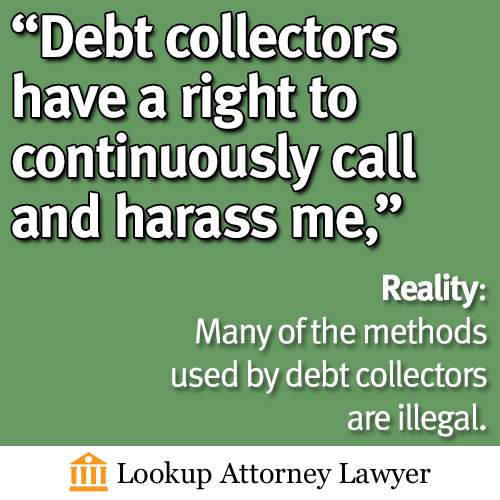Debt collection abuse is a huge problem, not just in Las Vegas but around the country. Debtors just like you routinely find themselves being harassed by threats from a collection agency, including phoning your friends and coworkers, using obscene language and threatening to ruin your credit or take you to court.
Don't continue to be harassed
You don’t have to put up with it! Stand up for your rights by finding out here exactly what steps you need to take to get debt collectors off your back.
Debt collectors want you to believe that they are entitled to harass you.
A debt collector may tell you that a warrant will be issued for your arrest within hours if you don’t make an immediate payment. They may inflate the amount of the original debt by adding on hundreds or thousands of dollars in fees and fines. They may try to wear you down by phoning at all hours of the day and night.
What you may not know is that all of the above actions on the part of debt collectors are illegal. Many people mistakenly believe that there is nothing they can do to protect themselves from debt harassment, and that they have no choice but to pay the debt collectors in order to make them go away. This is what the debt collectors want you to think.
There is an alternative
I am here to tell you that you do have rights! Thanks to the Fair Debt Collection Practices Act, debt collectors are prohibited by federal law from engaging in abusive practices. They are strictly regulated on what they can and cannot say to you. If you are being harassed by a debt collector, here are the action steps I recommend you take immediately in order to protect yourself:
- Do not admit that you owe the debt or agree to make a payment. Most debts expire after seven years, after which time the original creditor cannot legally make you pay. If you admit that you owe the debt to a collector over the phone, from that date forward, the seven year cycle starts over again. Do not give any information over the phone to a debt collector.
- Ask for the debt collector’s name and mailing address. Write it down while you have them on the phone, and make sure the collection agency name is spelled correctly. You will want to have an actual street address, not a PO Box, because the Debt Validation letter you are going to be sending to them (see #4) via registered mail can only be sent to a street address.
The collection agency knows this, and will try to give you a PO Box address. Insist that they give you a street address. If you have to, find the collection agency’s website and look for their street address there. You can also do a Google search on the collection agency’s name in order to locate their street address. - Do not argue with a debt collector. The person on the phone will try to bait you into arguing with them. They will speak rudely and in a badgering tone to you, in order to intimidate you into agreeing to pay the debt. Don’t fall for this. Don’t even give them a chance to hook your attention and upset you. Ignore every further call from the debt collectors after the first call in which you find out their name and mailing address. You do not need to speak to or negotiate with them at all. Put everything in writing. Do not pick up the phone.
- Send a Debt Validation letter via registered mail, return receipt requested. This is a letter in which you request that the debt collector validate the debt. This type of letter is like kryptonite to a collection agency. Following receipt of this letter, the collection agency is required by law to provide you with certain information, in writing, and if they cannot provide this information, they must stop contacting you.
What they don't want you to know
A collection agency purchases thousands of debts like yours at a time from various creditors, for pennies per debt. Because of this, they almost never have the original contract or paperwork you signed with the original creditor – such a volume of paperwork would be next to impossible for them to manage, and would require a large administrative staff that they couldn’t afford.

Legally, however, if you ask for it, the collection agency is required by law to provide you with this information. So you’re going to ask for it in your Debt Validation letter, and you’re going to give them 30 days to provide it you. If they do not comply, they must stop contacting you.
In your debt validation letter, you will ask for the following information:
- What the money you claim I owe is for.
- Explain and show me how you calculated this amount.
- Copies of any papers that show I agreed to pay this amount.
- A verification or copy of any judgment if applicable.
- The name of the original creditor.
- Identify the statute of limitations that has not expired on this account.
- Proof that you are licensed to collect debt in my state.
- A copy of your license number and Registered Agent.
- Proof that the collection agency owns the debt and/or has been assigned the debt, meaning proof that you are legally entitled to collect this debt from me.
- A complete payment history, starting with the original creditor. This should include the amount of the debt when the creditor assigned the debt to your company, and what fees/interest has been added to this debt, as well as how you determined these fees. This requirement was established by the case Fields v. Wilber Law Firm, Donald L. Wilber and Kenneth Wilber, USCA-02-C-0072, 7th Circuit Court, Sept 2004.
- A copy of the original signed loan agreement or credit card application (my contract with the original creditor establishing the debt between us).
Debt validation letter
The chances of a collection agency being in possession of this information is almost nonexistent. But when you ask for it, they must provide it, and they must do so within 30 days of the receipt of your letter. It’s very important that you send your Debt Validation letter via registered mail so that you have a record that the collection agency actually received it, and when. If you send it via regular mail, they can claim it never arrived.
In your Debt Validation letter, you will request, pursuant to the Fair Debt Collection Practices Act, that the collection agency restrict all further contact to writing. Request that they no longer contact you by phone. They are obligated by law to comply, once they receive your letter. Make sure you save copies of all correspondence.
Summary
Call a lawyer. If you continue to be harassed by an abusive collector after following the first four steps, know that that collection agency is breaking the law, and you can sue them. This is much less complicated than you would think.
An attorney with experience in debt harassment can take over your case and handle all further contact with the debt collector, so you can get some much needed peace of mind, as well as financial compensation for the harassment. If your case is successful, the abusive debt collector will be responsible for all court and attorney fees.
When the debt harassment begins negatively impacting your life, interfering with your sleep and work, and causing you undue stress, it might be time for a free consultation with my firm, Day & Nance.
We’ll go over the specifics of your case, and if you decide to let us represent you, we won’t see any compensation unless your case is successful, and when it is, the abusive debt collector will be required by law to pay our fee. Call me today, and put the harassment behind you.
 Learn more about Steven Day
Learn more about Steven Day




Add comment